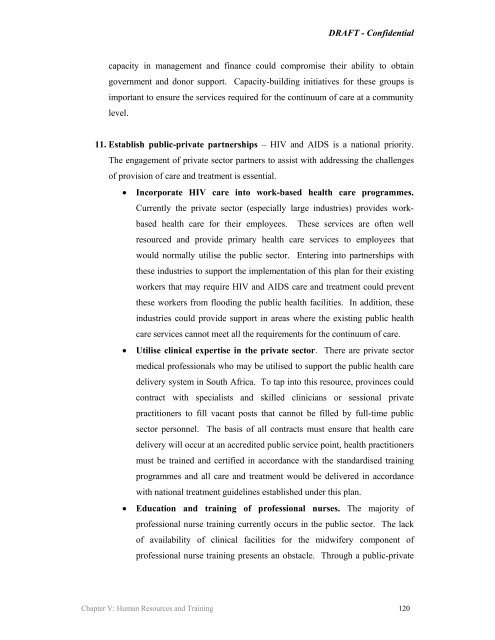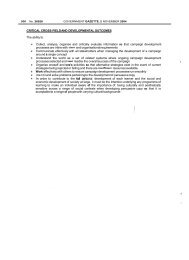Operational plan for comprehensive HIV and AIDS care and ...
Operational plan for comprehensive HIV and AIDS care and ...
Operational plan for comprehensive HIV and AIDS care and ...
You also want an ePaper? Increase the reach of your titles
YUMPU automatically turns print PDFs into web optimized ePapers that Google loves.
DRAFT - Confidential<br />
capacity in management <strong>and</strong> finance could compromise their ability to obtain<br />
government <strong>and</strong> donor support. Capacity-building initiatives <strong>for</strong> these groups is<br />
important to ensure the services required <strong>for</strong> the continuum of <strong>care</strong> at a community<br />
level.<br />
11. Establish public-private partnerships – <strong>HIV</strong> <strong>and</strong> <strong>AIDS</strong> is a national priority.<br />
The engagement of private sector partners to assist with addressing the challenges<br />
of provision of <strong>care</strong> <strong>and</strong> treatment is essential.<br />
• Incorporate <strong>HIV</strong> <strong>care</strong> into work-based health <strong>care</strong> programmes.<br />
Currently the private sector (especially large industries) provides workbased<br />
health <strong>care</strong> <strong>for</strong> their employees. These services are often well<br />
resourced <strong>and</strong> provide primary health <strong>care</strong> services to employees that<br />
would normally utilise the public sector. Entering into partnerships with<br />
these industries to support the implementation of this <strong>plan</strong> <strong>for</strong> their existing<br />
workers that may require <strong>HIV</strong> <strong>and</strong> <strong>AIDS</strong> <strong>care</strong> <strong>and</strong> treatment could prevent<br />
these workers from flooding the public health facilities. In addition, these<br />
industries could provide support in areas where the existing public health<br />
<strong>care</strong> services cannot meet all the requirements <strong>for</strong> the continuum of <strong>care</strong>.<br />
• Utilise clinical expertise in the private sector. There are private sector<br />
medical professionals who may be utilised to support the public health <strong>care</strong><br />
delivery system in South Africa. To tap into this resource, provinces could<br />
contract with specialists <strong>and</strong> skilled clinicians or sessional private<br />
practitioners to fill vacant posts that cannot be filled by full-time public<br />
sector personnel. The basis of all contracts must ensure that health <strong>care</strong><br />
delivery will occur at an accredited public service point, health practitioners<br />
must be trained <strong>and</strong> certified in accordance with the st<strong>and</strong>ardised training<br />
programmes <strong>and</strong> all <strong>care</strong> <strong>and</strong> treatment would be delivered in accordance<br />
with national treatment guidelines established under this <strong>plan</strong>.<br />
• Education <strong>and</strong> training of professional nurses. The majority of<br />
professional nurse training currently occurs in the public sector. The lack<br />
of availability of clinical facilities <strong>for</strong> the midwifery component of<br />
professional nurse training presents an obstacle. Through a public-private<br />
Chapter V: Human Resources <strong>and</strong> Training 120
















